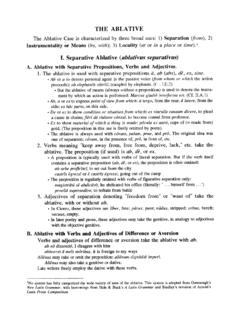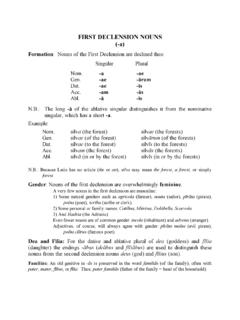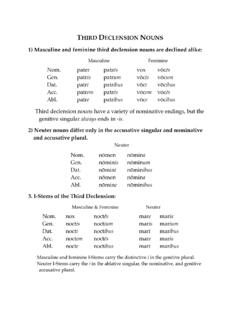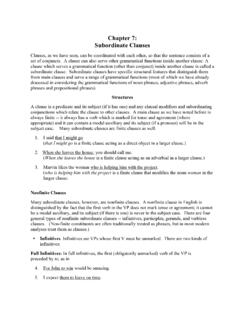Transcription of Cum Clauses - The Latin Library
1 Cum Clauses Cum as a preposition regularly is followed by the ablative case. Cum can also be a subordinating conjunction introducing a subordinate clause. There are four types of cum Clauses : Temporal: A temporal cum clause simply states the time at which something occurs without any further relationship between the events. The mood in a cum temporal clause is indicative: Cum Caesar consul erat, domus mea incendebatur. When Caesar was consul, my house was burned down. Cum Romae estis, agite sicut Romani. When you are in Rome, do like the Romans Circumstantial: A circumstantial cum clause states the circumstances or surrounding events at the time of the action in the main clause. The mood in a cum circumstantial clause is subjunctive: Caesar cum loqueretur, ab inimics interfectus est.
2 When Caesar was speaking, he was killed by his enemies. Causal: A causal cum clause state the cause of the action in the main clause. The mood in a cum causal clause is subjunctive: Cum nox iam appeteret, ad speluncam devertit. Because night was now approaching, he turned away into a cave. Dux urbem dedit cum hostes extra portas essent. The general surrounded the city because the enemies were at the gates. Concessive: A concessive cum clause express an incompatibility between the two Clauses . The mood in a cum concessive clause is subjunctive: Cicero, cum in oppido parvo natus esset, Romae tamen vivebat. Cicero, although he was born in a small town, nevertheless lived in Rome. Cum copiae hostium essent maiores, Romani tamen eas vicerunt.
3 Although the forces of the enemy were greater, the Romans nevertheless overcame them.










